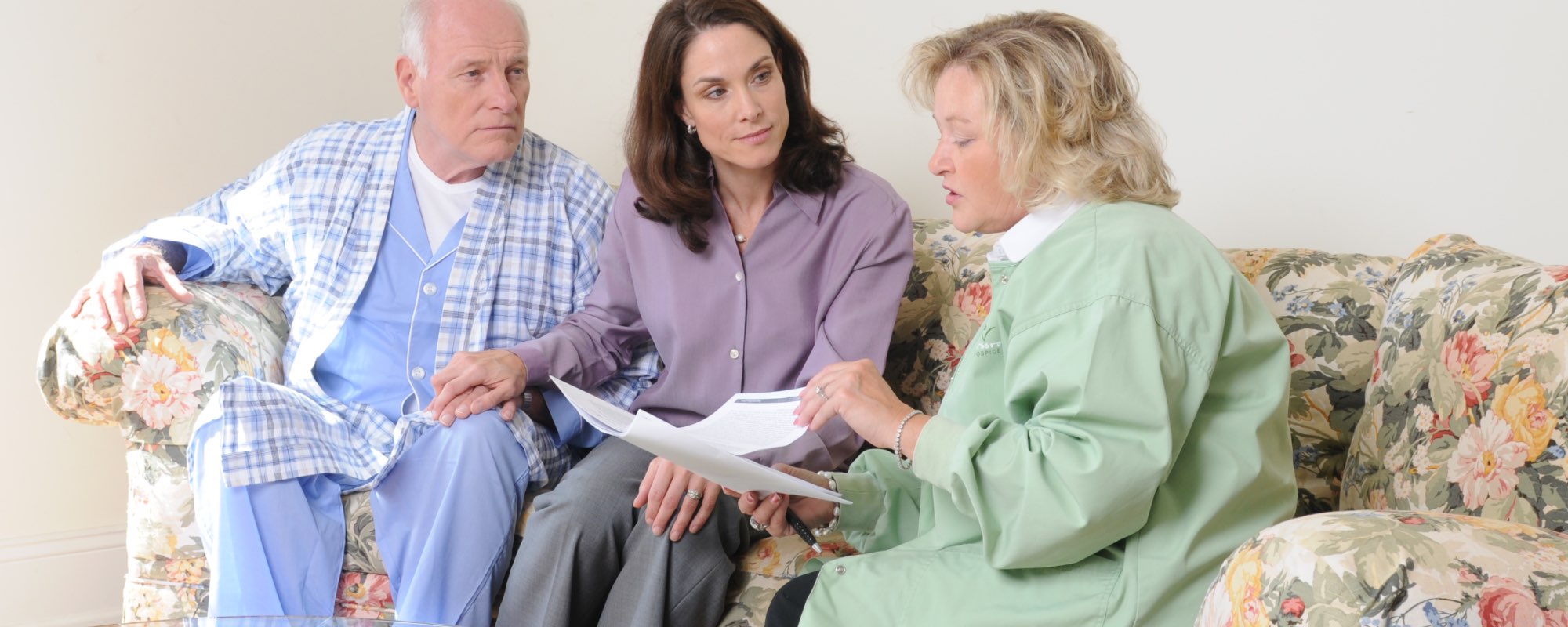
Paying for Hospice Care: Who Pays & What is Covered?
When a loved one has been diagnosed with a terminal illness, worries about the cost of end-of-life care can prevent them from pursuing essential services. Thankfully, patients who meet eligibility requirements have several options to ensure the patient and their families will receive the support they need at this difficult time.
Who is eligible for hospice care?
Hospice eligibility is a clinical diagnosis, made by your primary doctor. It is determined by assessing whether the patient’s medical condition is terminal. A terminal diagnosis is established when the patient is not expected to live more than six months if the illness runs its standard course. This diagnosis must be made in order for an insurance provider (including Medicare) to consider covering hospice care.
Who pays for hospice?

Hospice care is typically covered by some form of insurance, alleviating financial stress during a challenging time. Individuals with Medicare, Medicaid, or private insurance find hospice care is available at little or no cost to the patient or their family. Below are the most common payment options and what they cover:
Medicare - A majority of hospice patients don’t have to pay for hospice care thanks to their Medicare Hospice Benefit. The Medicare Hospice Benefit is designed to provide the terminally ill with the support of hospice comfort care. This benefit covers 100% of hospice-related fees, including medical supplies and prescriptions for pain and comfort management, with no deductibles or copays. Medicare is available for individuals aged 65 and older, as well as those with certain disabilities. Learn more.
Medicaid – Medicaid is available for hospice care in most states. Low-income individuals, families, seniors, and people with disabilities are generally eligible for Medicaid. While traditionally associated with financial hardship, Medicaid also covers younger hospice patients over 18 who may not have job-based insurance benefits. Each state has specific eligibility requirements, and coverage options can be discussed on a case-by-case basis with a billing coordinators. Learn more.
Private Insurance – While most private insurance companies model their Hospice benefit coverage on the Medicare Hospice Benefit program, families may face challenges in understanding how much is covered due to differences between policies. To navigate paying for hospice care through private insurance, it’s crucial to review your specific benefits package. Billing specialists can help clarify coverage and payment responsibilities. Learn more.
How do I pay for hospice if I don’t have insurance?
No patient should ever be denied hospice care because of inability to pay. If a patient is not covered by one of these options, Crossroads Hospice & Palliative Care will work with the patient and their family in paying for hospice care, and ensuring the patient receives the end-of-life care they need. Please give us a call at 888-603-MORE, to discuss your situation. We will work to find the best solution for your family.
If Medicare is paying for hospice, why did I still get a bill?
One thing that often causes confusion for patients and their families is the difference between hospice-related care and non-hospice-related care. Medicare, Medicaid and most insurance plans will cover the cost of hospice—which includes things like medical supplies and pain medicine. This is hospice-related care. What they won’t cover is non-hospice-related care, which is defined as any care needed that is not related to comfort of the patient. Think of it this way: If the patient needs stitches after an accidental fall or catches a cold and needs a Z-pack, those expenses aren’t related to hospice and would not be covered.
What services does hospice cover?

Hospice programs cover a wide range of end-of-life services including:
Nursing Care
Our team of highly trained nurses partner with the patient’s primary physician and caregivers to provide pain and symptom management in the patient’s home, assisted living facility, or nursing home. In addition, nurses will answer questions and provide education and training to family caregivers on the use of medication and medical equipment and supplies.
Personal Care
Hospice aides make regular visits to assist family caregivers or long-term-care facility staff with the patient’s personal care needs including baths and grooming. Aides report changes in the patient’s physical, emotional, and social needs to the interdisciplinary group for coordination of care.
Prescription Medication
All medication associated with managing the pain and symptoms of the patient’s terminal illness are provided at no cost to the patient. Your hospice care team will arrange for medications to be delivered as needed.
Medical Equipment
If the patient requires the use of medical equipment including a walker, wheelchair, oxygen or hospital bed, these are provided by the hospice to ensure patient comfort and safety. Your hospice care team will arrange for medical equipment to be delivered as needed and removed from the home if it is no longer needed by the patient.
Medical Supplies
If the patient requires medical supplies such as alcohol pads, incontinence pads, catheters, bedpans, or wound and skin care supplies, the hospice will provide those supplies related to the terminal condition but will also help arrange for those that are not.
Social Work Services
The hospice social worker provides organizational and emotional support to the patient and their family. This includes connecting the family with additional financial support programs or psychosocial support available in the community.
Bereavement Counseling
Bereavement counselors are available to provide comfort and support to the patient coming to terms with their diagnosis in addition to providing grief support to their family. Support and bereavement counselling is available to family both before and after the death of their loved one.
Therapy
Physical, occupational, and speech therapy deemed medically necessary by the hospice medical director and hospice IDG are provided to the patient.
Short-term Respite Care
Caregiving can be an exhausting role. To help prevent caregiver burnout, patients can be placed in an in-patient care facility for up to 5 days which is covered by the hospice, to give the caregiver a break. Both caregivers and patients can find respite beneficial to both their physical and mental wellbeing.
Unique Crossroads Hospice & Palliative Care Programs
In addition to the care and support of the hospice care team, Crossroads Hospice & Palliative Care also offers several unique programs to all of our patients and no additional cost.
Evenmore Care
When a patient begins to show signs that their final hours are approaching, our unique care model provides an increased level of care to ensure that we are there when patients and families need us most. We have consistently exceeded the national average for being bedside with the patient at the time of passing and providing support to the family at that difficult time.
Veteran Support
Crossroads Hospice & Palliative Care is proud to support our country’s military Veterans at end of life. Veterans often experience unique challenges connected to their time serving our country – even if many years have passed. This includes anxiety, depression, anger, guilt, and sleep disorders. Crossroads Hospice & Palliative Care staff and volunteers and trained to meet the special needs of our Veterans.
In addition, we have developed a Veteran Recognition Program to recognize the service and sacrifice made by our Veteran patients with a certificate and honorary presentation.
Gift of a Day
We strive to provide patients with the support they need to make the most of every day they have with their families. Our Gift of a Day program provides patients with one perfect day doing something they love whether that is a special meal with family, a performance of their favorite music, or a chance to do something they’ve never done before. Learn more.
Life Journals
Crossroads Hospice & Palliative Care volunteers are available to work with patients to collect stories and photos into a beautiful hardback book for their family. Life Journals record the patient’s life story to be enjoyed by the family for generations to come. Learn more.
Making the most of hospice care.
Although it can be difficult to start the hospice conversation, as well as the conversation regarding how do you pay for hospice care, it can be a great relief to patients and their families to know they can access wide range of support and services at little to no cost.
Regardless of your financial situation, hospice care is available to provide terminally ill patients and their families with much needed comfort and support. To speak with someone about the end-of-life care Crossroads Hospice & Palliative Care provides, please call 1-888-564-3405.
